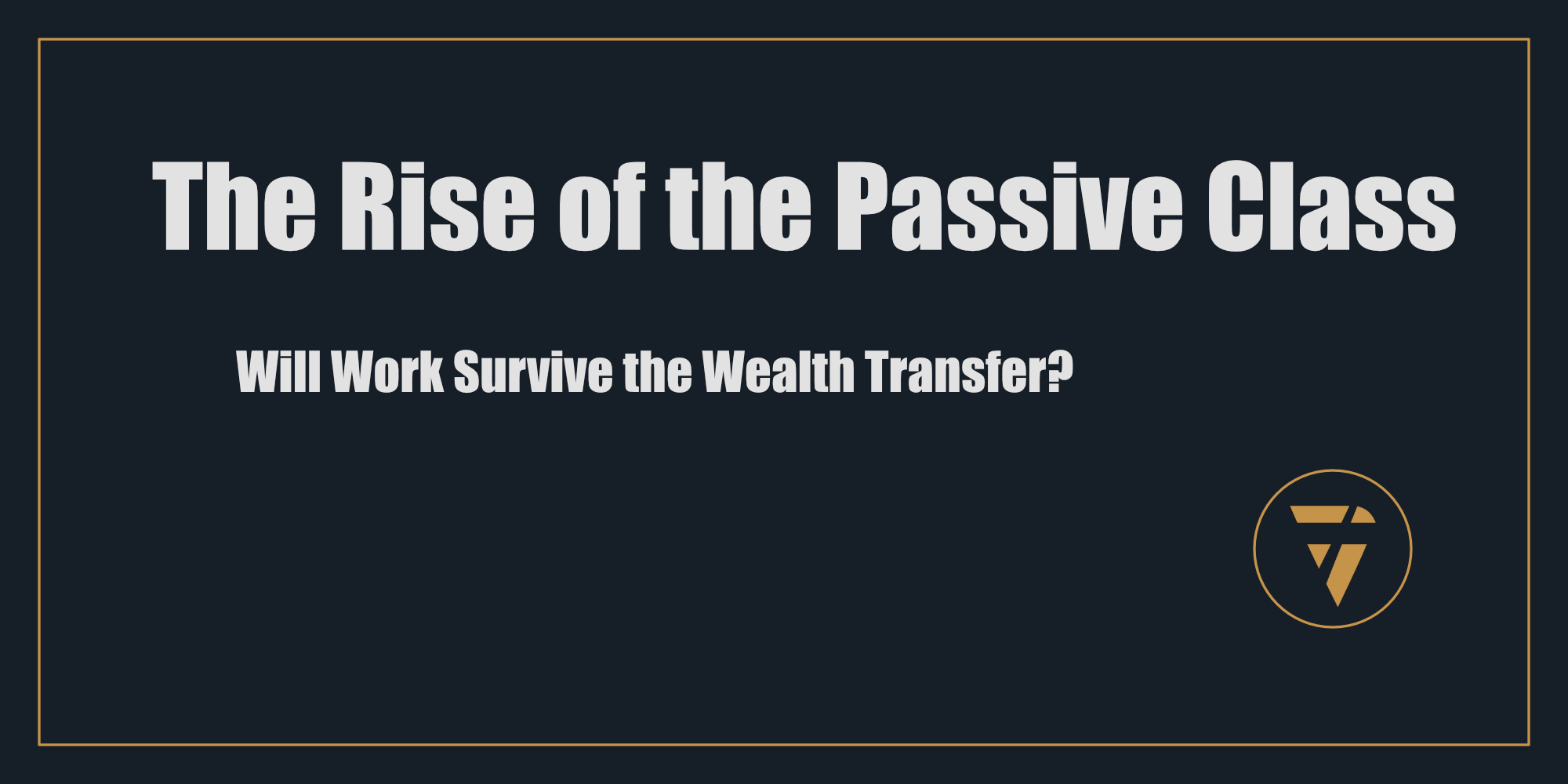The Rise of the Passive Class

Will Work Survive the Wealth Transfer?
A profound economic shift is coming. Canada is entering the largest intergenerational wealth transfer in history—up to $3 trillion will flow from baby boomers to their heirs over the next two decades. For some, this will be a lifeline, wiping out debt and securing stability. For others, it will be a ticket to unchecked spending, asset liquidation, and financial ruin.
But a deeper transformation is unfolding: the rise of the Passive Class.
For the first time, a significant percentage of working-age Canadians will suddenly find themselves financially secure—not through work, but through inheritance. This class will exist in a paradox: they are neither traditionally wealthy nor part of the working poor. They will live off passive income streams, asset appreciation, and financial inertia rather than earned wages.
What happens when millions of people no longer need to work to survive? Will society adapt, or will we enter a period of economic stagnation, class friction, and a crisis of purpose?
This is the beginning of a new era—one where the meaning of work itself is under threat.
1. The Passive Class: A New Economic Stratum
For centuries, work has been the defining metric of social and economic worth. Wealth was either earned through labour, investment, or entrepreneurship. Now, a new class is emerging—one that neither builds nor struggles.
This Passive Class is defined by several key characteristics:
- They inherit property, investments, or businesses but lack experience in managing them.
- They generate income passively (dividends, rental income, or trust funds) but do not actively create new wealth.
- They do not need to work in a traditional sense but are not rich enough to be elite investors or business owners.
- They often lack the financial literacy to sustain or grow their inherited wealth.
This class is different from "old money" dynasties. They are inheritors without a legacy. Their parents worked, built, and saved. They, however, will experience wealth without the discipline that created it.
The result? A generation with money, but no roadmap.
2. The Erosion of Work as a Necessity
For many, work has never been just about money—it’s about identity, purpose, and structure. The Passive Class disrupts this entirely.
Historically, economic systems were designed with a simple, unwritten social contract:
- Work hard, earn money.
- Save money, invest wisely.
- Pass wealth down to children, who repeat the cycle.
This was the middle-class blueprint.
But what happens when inheritors no longer need to work?
We are already seeing early signs:
- The decline of the traditional career path. Many millennials and Gen Z reject the "climb the ladder" model. With inheritance acting as a safety net, expect even more to opt out.
- A surge in financial minimalism. Many young inheritors will adopt "coasting strategies"—working only enough to maintain a lifestyle, rather than striving for financial expansion.
- A decline in business continuity. Over 60% of small businesses in Canada are owned by boomers. Their heirs, however, are largely uninterested in running them—meaning these companies will either be sold to corporations or shut down.
- A rise in gig and creative economies. Rather than entering traditional fields, Passive Class members will likely drift into low-pressure, passion-based, or gig work—coding, consulting, writing, or personal branding.
The death of "work as necessity" means the economy will shift into uncharted territory.
3. The Economic Risks of a Work-Optional Generation
When a significant portion of the population stops actively generating wealth, the broader economy suffers. The risks of this shift include:
1. Inflationary Pressure on Non-Productive Assets
- If a Passive Class chooses to spend rather than invest, expect inflation in luxury goods, speculative assets (crypto, art, collectibles), and leisure industries.
- Housing markets will see sharp, uneven shifts. Inheritors of property may sell en masse, causing price volatility in older neighbourhoods, while driving demand in urban centres.
2. Talent Drain and Labour Shortages
- With fewer people needing stable employment, industries reliant on long-term career progression—law, engineering, medicine—may see talent shortages.
- Expect a rise in short-term, part-time employment models where work is more about flexibility than advancement.
3. The Erosion of Economic Productivity
- Productivity grows when people innovate, start businesses, and reinvest in industries.
- A Passive Class that does not engage in active wealth creation will lead to economic stagnation, with wealth slowly leaking from private hands into corporate entities and taxation systems.
4. Increased Dependence on Passive Income Streams
- As Passive Class members liquidate wealth, capital will shift to corporations, private equity, and AI-driven financial systems—reducing overall economic dynamism.
- More people will rely on dividends, rental income, and stock appreciation rather than entrepreneurship, shrinking risk-taking innovation.
4. The Psychological Toll: Losing the Meaning of Work
Money without purpose can be a psychological trap. When people no longer work out of necessity, boredom, identity crises, and aimlessness take over.
- A lack of struggle can lead to a loss of motivation.
- Without clear financial goals, many inheritors will experience "directional paralysis"—uncertain of what to do with their money, time, or skills.
- Many will fall into overconsumption, depression, or reckless financial behaviour.
We’ve seen this before. The descendants of great industrialists, oil barons, and real estate moguls often fail to sustain their inherited fortunes. The third-generation rule exists for a reason: wealth without struggle creates financial fragility.
5. Will Work Survive? The Three Possible Futures
This transformation could lead to three distinct economic futures:
Scenario 1: The Passive Class Reinvents Work
- Rather than rejecting work entirely, they reshape it into low-pressure, meaningful, creative endeavours.
- Entrepreneurial activity shifts away from necessity and into passion-driven projects—impact investing, and community-driven businesses.
- A new work-leisure hybrid emerges, where work is no longer a requirement but an intellectual and social pursuit.
Scenario 2: A Financially Illiterate Collapse
- If inheritance is mismanaged, squandered, or poorly reinvested, the Passive Class will rapidly cycle back into financial precarity.
- A rise in financial coaching, wealth management, and estate planning industries emerges as a last-ditch effort to prevent widespread economic loss.
Scenario 3: A New Elite Forms
- The Passive Class splits into two groups: those who sustain and grow their wealth, and those who fall back into wage dependency.
- A new economic caste system develops, where financial competence—not just capital—determines long-term class status.
The Work of the Future Will Be Redefined
The rise of the Passive Class does not mean the death of work—but it does mean a radical transformation of how work is valued, structured, and pursued.
Work won't vanish, but its purpose will shift.
- Some will still work out of passion, ambition, or personal fulfillment. I do.
- Others will drift, seeking identity in a post-labour world.
- Many will squander their inherited wealth, only to re-enter the workforce decades later.
The coming decades will define who masters this wealth shift—and who lets it slip away.
The Passive Class will rise, but how long it lasts is another question entirely.
This is what I’m working on. Tell me what you think, I enjoy the conversation! Subscribe and follow the work in real time.
Thanks!
B

The Passive Class is rising. Inheriting wealth, but not the wisdom that built it
Work optional. Purpose unclear. Most will lose it.
$3T is changing hands. The real question—who keeps it?
PS -






